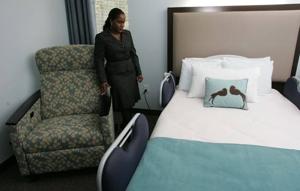 A study claims that adults need 7 hours of sleep each night.
A study claims that adults need 7 hours of sleep each night.
Seven hours of shut-eye: That's the minimum amount of sleep that adults need each night for best health, according to new recommendations from a panel led by a University of Washington sleep expert.
And functioning effectively - without guzzling gallons of coffee - could require even more sleep, said Dr. Nathaniel F. Watson, a professor of neurology and co-director of the UW Medicine Sleep Center.
"Seven hours - that's the lower limit of the threshold," said Watson. "We don't want people walking away thinking, 'I need only seven hours of sleep a night.'"
In fact, the 15-member panel declined to put an upper limit on ideal sleep for adults ages 18 to 60 after spending a year reviewing more than 5,300 scientific articles about the link between sleep and optimal health. The results were published in the journal Sleep.
"This is a general recommendation for what it takes to remain alert and productive without stimulants," Watson said, adding that the advice applies to those older than 60, as well.
Sleeping nine hours or more a night might be appropriate for young adults, people recovering from sleep deficits and those who are ill. It's not clear whether sleeping so long is ideal for everyone else - but it's almost certainly better than sleeping too little, the researchers agreed.
Getting that message across may be difficult in the U.S., where about one-third of people ages 18 and older say they sleep six hours or less a night, according to a new federal study.
Sleep deprivation is sometimes seen as a badge of the busy or a marker of determination, Watson said.
"It's the zeitgeist of our times," he said. "We're trying to get at this notion that if you're Type A, you don't sleep. How do we change that?"
In fact, sleeping less than seven hours a night is associated with all kinds of health problems: weight gain and obesity, diabetes, high blood pressure, heart disease, depression - and a higher risk of early death, the researchers found. It is also linked to decreased immune-system function, greater pain sensitivity, problems performing at work or other activities, increased errors and a higher risk of accidents, the group noted.
To determine how much sleep is enough, Watson recommended that people conduct a three-week experiment.
"Go to bed when you're tired; wake up spontaneously when you feel rested," he said. "Then assess how you feel during the day, how you perform during the day."
At least seven hours of snooze time will likely boost both measures, he predicted. While caffeine and other stimulants temporarily mask the effects of fatigue, they do nothing to prevent the toll on health.
"It's really important for people to understand there's no substitute for sleep," Watson said.
Read more here
No comments:
Post a Comment